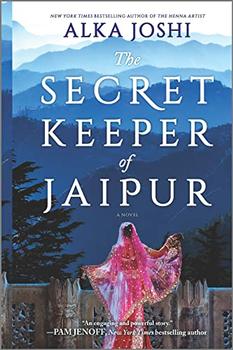Summary | Excerpt | Reading Guide | Reviews | Beyond the Book | Readalikes | Genres & Themes | Author Bio

The Jaipur Trilogy #2
by Alka Joshi
At my stall, I removed the flowers from the large shallow basket I'd woven with fairy grass and arranged them on a horsehair blanket on the ground. When Chullu began fussing, I reached into my blouse, extracting a small rag from my leaking breasts to give to him. He began sucking on it and quieted down. Soon he would begin to teethe, and eventually I would have to stop suckling him, but for now I enjoyed feeling his warmth—Dev's warmth—next to my body.
The last thing I always unpacked was the silver statue of Shiva. I set it to one side after offering a silent prayer to him, to thank him for my Chullu. Then I put both my children in the empty basket. Like my mother before me and her mother before her, I had learned to tether my babies when I was busy boiling goat milk for the cheese, sewing a coat or gathering dung for the fire. Chullu watched as I tied the cloth rope around his wrist. When I kissed his cheeks, he squirmed to one side and rocked his head back. Rekha played with his hair. No sooner had she braided his curls than he shook his head and giggled, tossing the braid off, and she had to start over again.
I knew I looked different from the other vendors along the walkway, and this I saw as an advantage, particularly with tourists—honeymooning Indians, elders on spiritual retreats, Europeans fascinated by our tribal ways. Like other women of my tribe, I wore my flowered skirt in bright yellow cotton over my green salwar kameez. A silver medallion sat like a small cap on my hair, crowning the orange chunni draped over my head and around my shoulders. A rope made of sheep wool, boiled and dyed black, was tied twenty times around my waist. Then there were the telltale dots—three of them tattooed in a triangle onto my chin when I came of age—that always made visitors to Shimla stare. The only thing I'd stopped wearing was the elaborate nose ring—as large as a bracelet—given to me at my wedding; I realized it made me not just a curiosity but almost a sideshow, with visitors pointing it out to one another. They thought they were being discreet, but I found the fascination in their faces disturbing.
After Dev died in the gorge, I'd became adamant that my children would never suffer the same fate, migrating back and forth with the tribe through the mountains, toes lost to frostbite, the threat of death always only a few paces away. I asked my father-in-law to let me stay in Shimla. He would have liked me to marry another bachelor from our tribe, but he was grieving over his son's death, too, and agreed, reluctantly, on the condition that I would have to make my own way. His parting gift to me was a large supply of dried meat and all the silver jewelry from my dowry. As a woman, I had no right to property, not even a sheep or a goat, but I knew I could sell my jewelry if we fell on hard times.
To the left of my stall on the Shimla Mall, a balloon seller was squeezing his air sausages into the shapes of elephants and camels. My children watched, fascinated. Chullu reached for one, but Rekha gently pulled his arm down. To my right was a Coca-Cola stand whose owner had not yet arrived. It was a little early in the day for people to ask for a cool drink. By afternoon, visitors would be lining up for its exotic taste.
The clock at Christ Church struck eight times. On spring mornings, early risers hiked to pray at the temples on Jakhu Hill, Sankat Mochan or Tara Devi. The mildly religious slept in late; there was no need for them to hurry about their day.
I spotted a young man and a woman in the distance walking purposefully in my direction. The woman wore a maroon sari and a matching wool cloak, embroidered at the edges with white flowers. She walked quickly, taking short strides. Her hair was pinned neatly to the top of her head in a twist. The young man was lean, a head taller than the woman, but his walk was looser, as if he had all the time in the world. Still, he easily kept pace with her. When they were closer to my stall, I noticed that she was old enough to be his mother. Fine lines crisscrossed her forehead and the corners of her mouth. The man looked to be no more than twenty, perhaps a few years younger than me. He was dressed in a white shirt, blue jumper and dark gray slacks. The woman's eyes were focused on my flowers, while his, bouncing with amusement, were watching my children in the basket.
Excerpted from The Secret Keeper of Jaipur by Alka Joshi. Copyright © 2021 by Alka Joshi. Excerpted by permission of Mira. All rights reserved. No part of this excerpt may be reproduced or reprinted without permission in writing from the publisher.




Discovery consists of seeing what everybody has seen and thinking what nobody has thought.
Click Here to find out who said this, as well as discovering other famous literary quotes!
Your guide toexceptional books
BookBrowse seeks out and recommends the best in contemporary fiction and nonfiction—books that not only engage and entertain but also deepen our understanding of ourselves and the world around us.